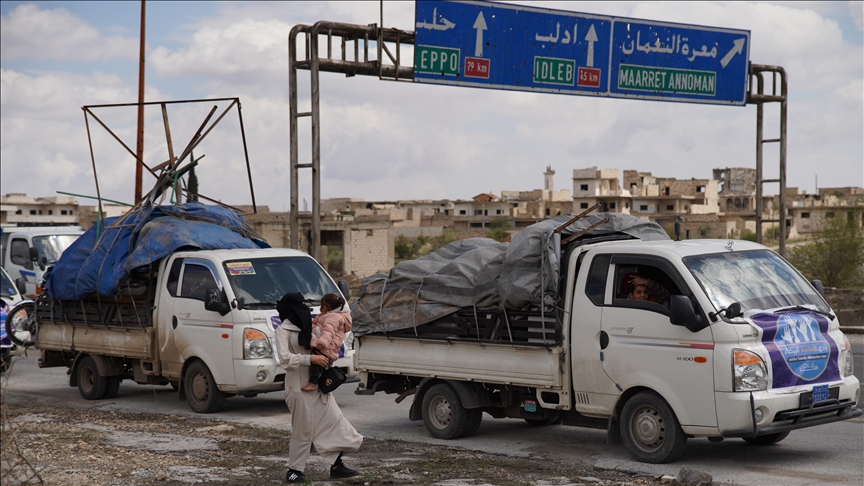Over 2.2M Syrians returned home since Assad’s fall, UN says
Senior official urges international community to ‘mobilize resources for Syria’s reconstruction and development’
 Syrians, with their belongings, return to their villages as part of the "Return Caravan" campaign launched in cooperation with local non-governmental organizations, in Hama, Syria on April 12, 2025. Civilians who were displaced from their hometowns for years due to forced migration, military operations, and attacks are now returning home.
Syrians, with their belongings, return to their villages as part of the "Return Caravan" campaign launched in cooperation with local non-governmental organizations, in Hama, Syria on April 12, 2025. Civilians who were displaced from their hometowns for years due to forced migration, military operations, and attacks are now returning home.
WASHINGTON
More than 2.2 million Syrians – including internally displaced people and refugees returning from abroad – have returned to their home country in recent months, the UN said Monday, urging the international community to step up support for recovery and reconstruction efforts in the war-torn country.
“As of mid-July, over 1.5 million internally displaced persons had returned to their home areas, along with about 700,000 refugees returning from abroad, with the pace of returns slightly increasing during summer and the end of the school year,” said Edem Wosornu, director of operations and advocacy at the UN Office for the Coordination of Humanitarian Affairs (OCHA), addressing the Security Council on behalf of Tom Fletcher, the UN’s top humanitarian chief.
Wosornu welcomed the easing of “unilateral sanctions,” a World Bank grant to support Syria’s electricity sector, and increased regional investments – but warned that the returns place further pressure on already fragile public services such as healthcare, education, and water.
She called on the international community to “mobilize resources for Syria’s reconstruction and development,” urging a transition from humanitarian relief to recovery.
“Such investment will be particularly critical to support the growing numbers of people returning to their homes,” she added.
UN envoy for Syria Geir O. Pedersen also briefed the Security Council on the recent escalation in the country. He said a ceasefire declared on July 19 in Sweida was “largely holding” after Bedouin forces withdrew and security units redeployed at the edges of the governorate, but the situation remained “tense and volatile.”
“I condemn the appalling violations against civilians and combatants in Sweida. I also condemn Israel’s intervention and dangerous airstrikes in Sweida and Damascus,” Pedersen said, urging all parties to uphold international humanitarian law.
Turning to the northeast, Pedersen said efforts to implement the March 10 agreement signed between the government in Damascus and the YPG/PKK-led Syrian Democratic Forces (SDF) remain challenging.
“We are continuing to engage both sides on the importance of making compromises, to make progress on their agreed goal of implementing the 10 March agreement before the end of the year,” he added.
Since the ouster of Bashar al-Assad’s regime in late 2024, Syria’s new administration has launched economic and political reforms and intensified efforts to build partnerships with regional and international players.
Assad, Syria’s leader for nearly 25 years, fled to Russia in December, ending the Baath Party regime, which had been in power since 1963. A new transitional administration led by President Ahmad al-Sharaa was formed in January.
Anadolu Agency website contains only a portion of the news stories offered to subscribers in the AA News Broadcasting System (HAS), and in summarized form. Please contact us for subscription options.







